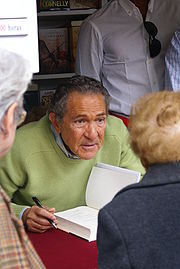
Antonio Gala
Encyclopedia

Spain
Spain , officially the Kingdom of Spain languages]] under the European Charter for Regional or Minority Languages. In each of these, Spain's official name is as follows:;;;;;;), is a country and member state of the European Union located in southwestern Europe on the Iberian Peninsula...
poet
Poet
A poet is a person who writes poetry. A poet's work can be literal, meaning that his work is derived from a specific event, or metaphorical, meaning that his work can take on many meanings and forms. Poets have existed since antiquity, in nearly all languages, and have produced works that vary...
, playwright
Playwright
A playwright, also called a dramatist, is a person who writes plays.The term is not a variant spelling of "playwrite", but something quite distinct: the word wright is an archaic English term for a craftsman or builder...
, novelist and writer
Writer
A writer is a person who produces literature, such as novels, short stories, plays, screenplays, poetry, or other literary art. Skilled writers are able to use language to portray ideas and images....
.
Gala was born in Brazatortas
Brazatortas
Brazatortas is a municipality in Ciudad Real, Castile-La Mancha, Spain. It has a population of 1,200.In 1950 it had a population of 1,669....
, Ciudad Real
Ciudad Real
Ciudad Real is a city in Castile-La Mancha, Spain, with a population of c. 74,000. It is the capital of the province of Ciudad Real. It has a stop on the AVE high-speed rail line and has begun to grow as a long-distance commuter suburb of Madrid, located 115 miles to the north. A high capacity...
(Castile-La Mancha
Castile-La Mancha
Castile-La Mancha is an autonomous community of Spain. Castile-La Mancha is bordered by Castile and León, Madrid, Aragon, Valencia, Murcia, Andalusia, and Extremadura. It is one of the most sparsely populated of Spain's autonomous communities...
), although he moved very soon to Córdoba and is widely considered an Andalusia
Andalusia
Andalusia is the most populous and the second largest in area of the autonomous communities of Spain. The Andalusian autonomous community is officially recognised as a nationality of Spain. The territory is divided into eight provinces: Huelva, Seville, Cádiz, Córdoba, Málaga, Jaén, Granada and...
n.
A graduate in law
Law
Law is a system of rules and guidelines which are enforced through social institutions to govern behavior, wherever possible. It shapes politics, economics and society in numerous ways and serves as a social mediator of relations between people. Contract law regulates everything from buying a bus...
, philosophy
Philosophy
Philosophy is the study of general and fundamental problems, such as those connected with existence, knowledge, values, reason, mind, and language. Philosophy is distinguished from other ways of addressing such problems by its critical, generally systematic approach and its reliance on rational...
, politics
Politics
Politics is a process by which groups of people make collective decisions. The term is generally applied to the art or science of running governmental or state affairs, including behavior within civil governments, but also applies to institutions, fields, and special interest groups such as the...
and economics
Economics
Economics is the social science that analyzes the production, distribution, and consumption of goods and services. The term economics comes from the Ancient Greek from + , hence "rules of the house"...
, he has written in a wide variety of genres, including journalism, short stories, essays and television script
Teleplay
A teleplay is a television play, a comedy or drama written or adapted for television. The term surfaced during the 1950s with wide usage to distinguish a television plays from stage plays for the theater and screenplays written for films...
s. He has been awarded several prizes, not only within the field of poetry but also for his contributions to theatre
Theatre
Theatre is a collaborative form of fine art that uses live performers to present the experience of a real or imagined event before a live audience in a specific place. The performers may communicate this experience to the audience through combinations of gesture, speech, song, music or dance...
and opera
Opera
Opera is an art form in which singers and musicians perform a dramatic work combining text and musical score, usually in a theatrical setting. Opera incorporates many of the elements of spoken theatre, such as acting, scenery, and costumes and sometimes includes dance...
.
Gala's work has been more appreciated by his readership than by the critics, who find it hard to classify it due to its particular blend of lyricism and epic.
Among his most successful plays are Los verdes campos del Edén (The Green Fields of Eden, National Theatre Prize "Calderón de la Barca" 1963), Anillos para una dama (Rings for a Lady, 1973), ¿Por qué corres, Ulises? (Why do you run, Ulysses?, 1975), Petra Regalada (1980), Samarkanda (1985), Carmen, Carmen (1988) and La truhana (The rogue, 1992).
Among his collections of poetry are Sonetos de La Zubia (La Zubia Sonets), Poemas de amor (Love Poems), Testamento Andaluz (Andalusian Will) and Enemigo íntimo (Intimate Enemy, Adonais Prize 1959).
He started to write novels late in life, but he obtained an overwhelming success with El manuscrito carmesí (The Crimson Manuscript, Planeta Prize 1990), Águila Bicéfala (Two-Headed Eagle, 1994), La regla de tres (The Rule of Three, 1996) and La pasión turca (Turkish Passion, 1993), adapted for the cinema by Spanish director Vicente Aranda
Vicente Aranda
Vicente Aranda , is a Spanish film director, screenwriter and producer.Due to his refined and personal style, he is one of the most renowned Spanish filmmakers. He started as a founded member of the Barcelona School of Film and became known for bringing contemporary Spanish novels to life on the...
and Más allá del Jardín (Beyond the Garden, 1995), adapted by Pedro Olea.
Gala's literature is marked by historic issues, which are used more to lighten the present than to deepen in the past.
He is the current president of the International Theatre Institute.

